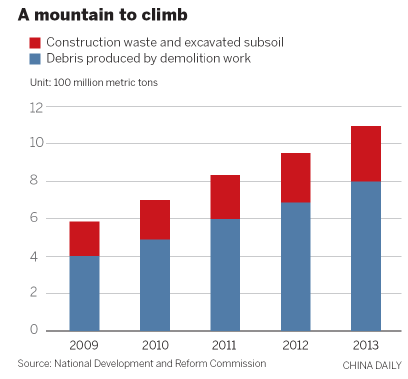 |
Many experts said the disposal of construction waste nationwide is an even more pressing problem than in Shenzhen, where it has at least received official attention.
He Gengxin, a researcher at the Chinese Academy of Building Research, who researches disposal methods for construction waste, said the problem is widespread. "The fact is, the dumping sites in many first- and second-tier cities are already functioning beyond their capacities," he said.
According to Chen, there are very few barriers to the demolition of old residential communities, which means demolition work is carried out randomly: "Many cities are taking on a new look every three to five years as the rate of urbanization quickens."
In February, Xinhua News Agency reported that Beijing planned to demolish approximately 15 million sq m of illegal buildings this year to improve urban management. According to Chen, that program alone could generate 15 million tons of waste in the capital by the end of the year.
A property developer surnamed Wu, from Mianyang, Sichuan province, said local construction companies can use an information-sharing platform to post details of the waste they have generated and then sell it to other developers, such as road builders, for use in their own projects. Companies that don't dispose of the waste in this way have to dump it at privately owned sites at a cost of about 5 yuan per cu m.
The platform operator acts as an intermediary between supply and demand sides. "He pays you for the waste and then sells it other engineering projects. If not, he helps you transfer the waste and earn money from transporting it," Wu said.
Future concerns
The Shenzhen landslide has prompted safety checks at dumping sites across the country.
The Shanghai government has ordered all ongoing construction sites, including those for real estate and subways, to assess and overhaul the ways they dispose of construction trash.
"By Wednesday, the city and district-level administrations of forestry and landscaping, which oversee the disposal of building waste in their areas of jurisdiction, had checked all 238 construction sites in the municipality. They didn't find any signs that construction waste has been piled too high," said Xu Wei, a spokesman for the Shanghai Municipal People's Government.
In Shanghai, construction waste is mainly used to backfill low-lying land, rivers and ditches, and to promote recycling and utilization it is also used in local landscape architectural projects.
According to Shen Sanxin, chief engineer at Shanghai Zhuzong Group Construction Development, the urban management department imposes administrative penalties on designated transporters of building trash who dispose of it in unauthorized ways or who cause pollution by failing to transport the waste in sealed containers.
"In June, the city authority said it would increase the number of surveillance cameras to build a stronger monitoring network," Shen said.
However, Chen said the only long-term solution to the problem lies in greater use of recycled waste from construction sites. "First, there should be nationwide legislation on the disposal of construction waste to prevent random dumping and encourage recycling," he said, adding that developers should regard construction waste as a ready-made resource for recycling.
"Given the volume of waste generated every year, it's impossible to dump all of it," he said.
Based on the current rate of generation, every urban area in the city would be covered by construction waste within 300 years, but local authorities have little motivation to build dumping and recycling facilities because they generate very little money, according to Chen.
"Constructing new buildings is like building a kitchen, while building site for dumping and recycling is like building a toilet. At the moment, everybody wants the kitchen, but nobody wants the toilet," he said.
